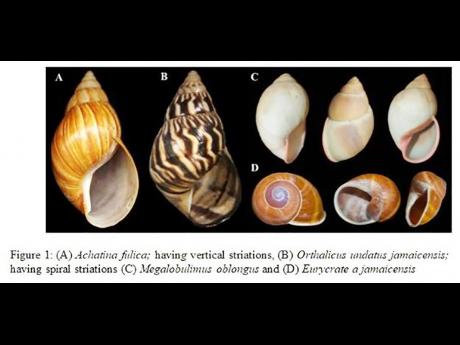Call for tighter border control amid Giant snail threat
The Giant African Snail presents a grave threat to human health, as the carrier of the rat lungworm parasite potentially causes meningitis, an inflammation of the brain membrane.
The snails feed on a wide array of plants of primary economic importance, such as ornamentals, but their diet includes breadfruit, papaya, and legumes, says Marco-Dean Brown, a PhD student in the Department of Life Sciences at The University of the West Indies (UWI), Mona.
Jamaica was placed on high alert for the snail because of an outbreak in Florida.
“It's really concerning should this be introduced to Jamaica,” he lamented.
Dead snails also leave behind a massive shell that collects water and could become active breeding sites for mosquitoes.
Brown told The Gleaner that last year there were 24 confirmed reports of infection with a parasite among Jamaicans and four different species of snails were introduced to the island.
“It is an indication to us as a country that we need to have tighter control at our borders. There are lots of laws that are on the books but they are poorly executed,” Brown said in a Gleaner interview.
“We need to ensure that we have persons who are properly trained at our ports to ensure that these animals don't get introduced to our country. If they are not, they will just see a snail as a snail,” he added.
Senior plant health and food safety officer at the Rural Agricultural Development Authority (RADA), Francine Webb-Lawrence, said that as part of its public education campaign, the authority has issued additional notifications to its extension staff and has been engaging farmers more on the subject.
RADA has some 98 agriculture extension officers, 50 agriculture assistants, 13 livestock extension officers, and 13 marketing extension officers.
She noted that Jamaica has been undertaking surveillance for the pest for several decades, as the Giant African Snail has been present in a number of Caribbean countries since the 1980s.
Webb-Lawrence told The Gleaner that RADA has also activated its plant health coordinating committee grouping and an emergency action plan will be adapted for the particular pest.
The Giant African Snail has versatile adaptation and reproduces very fast – producing between 100 and 400 eggs at a time and up to 1,200 eggs per year, she said.
“If anything is seen, it should be brought to our attention quickly. If that is not done, the eradication efforts are going to be quite challenging, based on their invasive nature,” the RADA technical expert said.
The Giant African Snail feeds on more than 500 types of plants, including banana, cassava, cabbage, cauliflower, broccoli, among other things.
Webb-Lawrence explained that the entry of the pest on a commercial field could have a serious impact on exports from Jamaica.
“With the resources that we have which are very strained now, it would cost us quite a bit in order to implement these eradication measures. In Florida, they have spent millions of dollars in order to eradicate it, and we don't want to get to that stage,” Webb-Lawrence said.
The pest's nocturnal habits make RADA heavily dependent on the public to make reports of sightings.
Members of the public are being encouraged not to kill the snails as inappropriate methods may result in the release of eggs, therefore increasing the risk of spread.
“We really don't want people going out there to just wantonly kill every snail that they see,” Webb-Lawrence said.
Call or send a picture via WhatsApp 876-442-0814 to make a report or contact a RADA extension officer.


